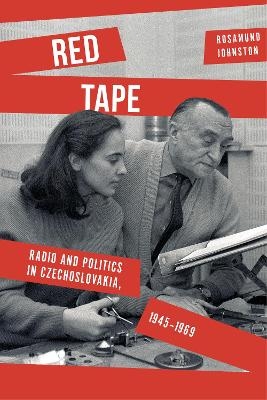
Red Tape
Radio and Politics in Czechoslovakia, 1945-1969
Seiten
2024
Stanford University Press (Verlag)
978-1-5036-3516-6 (ISBN)
Stanford University Press (Verlag)
978-1-5036-3516-6 (ISBN)
In socialist Eastern Europe, radio simultaneously produced state power and created the conditions for it to be challenged. As the dominant form of media in Czechoslovakia from 1945 until 1969, radio constituted a site of negotiation between Communist officials, broadcast journalists, and audiences. Listeners' feedback, captured in thousands of pieces of fan mail, shows how a non-democratic society established, stabilized, and reproduced itself. In Red Tape, historian Rosamund Johnston explores the dynamic between radio reporters and the listeners who liked and trusted them while recognizing that they produced both propaganda and entertainment.
Red Tape rethinks Stalinism in Czechoslovakia—one of the states in which it was at its staunchest for longest—by showing how, even then, meaningful, multi-directional communication occurred between audiences and state-controlled media. It finds de-Stalinization's first traces not in secret speeches never intended for the ears of "ordinary" listeners, but instead in earlier, changing forms of radio address. And it traces the origins of the Prague Spring's discursive climate to the censored and monitored environment of the newsroom, long before the seismic year of 1968. Bringing together European history, media studies, cultural history, and sound studies, Red Tape shows how Czechs and Slovaks used radio technologies and institutions to negotiate questions of citizenship and rights.
Red Tape rethinks Stalinism in Czechoslovakia—one of the states in which it was at its staunchest for longest—by showing how, even then, meaningful, multi-directional communication occurred between audiences and state-controlled media. It finds de-Stalinization's first traces not in secret speeches never intended for the ears of "ordinary" listeners, but instead in earlier, changing forms of radio address. And it traces the origins of the Prague Spring's discursive climate to the censored and monitored environment of the newsroom, long before the seismic year of 1968. Bringing together European history, media studies, cultural history, and sound studies, Red Tape shows how Czechs and Slovaks used radio technologies and institutions to negotiate questions of citizenship and rights.
Rosamund Johnston is a postdoctoral researcher at the University of Vienna
| Erscheinungsdatum | 27.02.2024 |
|---|---|
| Reihe/Serie | Stanford Studies on Central and Eastern Europe |
| Zusatzinfo | 22 halftones |
| Verlagsort | Palo Alto |
| Sprache | englisch |
| Maße | 152 x 229 mm |
| Themenwelt | Geisteswissenschaften ► Geschichte ► Regional- / Ländergeschichte |
| Sozialwissenschaften ► Kommunikation / Medien ► Medienwissenschaft | |
| Sozialwissenschaften ► Politik / Verwaltung | |
| ISBN-10 | 1-5036-3516-3 / 1503635163 |
| ISBN-13 | 978-1-5036-3516-6 / 9781503635166 |
| Zustand | Neuware |
| Informationen gemäß Produktsicherheitsverordnung (GPSR) | |
| Haben Sie eine Frage zum Produkt? |
Mehr entdecken
aus dem Bereich
aus dem Bereich
Erinnerungen
Buch | Softcover (2024)
Pantheon (Verlag)
16,00 €
Universalgelehrter, Polarreisender, Entdecker
Buch | Hardcover (2024)
mareverlag
28,00 €


